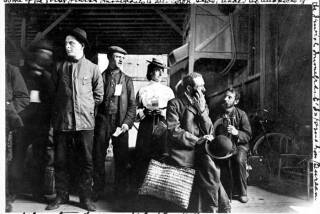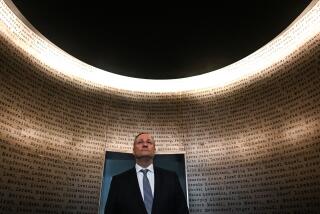Irving Howe; Writer, Critic, Chronicler of Immigrants
- Share via
Irving Howe, author, critic and leftist intellectual who chronicled the genius for survival among Jewish-American immigrants in his best-selling “World of Our Fathers,” died Wednesday in New York City at the age of 72.
Howe, who lived in Manhattan, died in Mt. Sinai Hospital after the main artery in his heart ruptured, his wife, Ilana, said. Howe had undergone heart bypass surgery last year.
“Irving Howe combined in quite a remarkable way great gifts as a literary critic and also as a social and political thinker,” said the historian and writer Arthur Schlesinger.
Howe’s 1976 Jewish history, subtitled “The Journey of Eastern European Jews to America and the Life They Found and Made,” won a National Book Award.
In reviewing the book for the Los Angeles Times, critic Harold Clurman noted that one need not be Jewish to find pleasure in reading it.
“ ‘World of Our Fathers’ is a book of immense erudition: The extent of concrete information contained in it is extraordinary,” Clurman wrote. “None of it, however, is dry because all of it leads to consideration of living values. These affect us not as Jews or Gentiles but as Americans and even more broadly as world citizens.”
For four decades, Howe edited the political and literary journal Dissent, which he co-founded in 1953, exercising his background as commentator and critic in both fields.
“Despite its circulation of about 5,000,” the New York Times Book Review once noted, “Dissent ranks among the handful of political journals read most regularly by American intellectuals. And it is virtually alone in its explicit affirmation of democratic socialism.”
Born June 11, 1920, in New York to Jewish immigrants from Ukraine, Howe earned a bachelor’s degree at City College of New York and did graduate work at Brooklyn College.
As a teen-ager, Howe embraced Trotskyism in 1934 and wrote for the leftist newspaper Labor Action. He was also active in the Independent Socialist League.
His radicalism was modified, however, toward socialism emphasizing the need for democracy during World War II when he was drafted into the Army and spent three years at a military base in Alaska.
“Enforced isolation and steady reading together brought about a slow intellectual change,” he wrote in his book “A Margin of Hope,” published in 1982. “I lost the singleness of mind that had inspired the politics of my youth.”
Howe wrote prolifically on many subjects, including literary, political and labor luminaries and ideas.
Among his books are “The UAW and Walter Reuther,” published in 1949; “William Faulkner: A Critical Study,” 1952; “Politics and the Novel,” 1957; “Celebrations and Attacks: 30 Years of Literary and Cultural Commentary,” 1978; “Leon Trotsky,” 1978, and “Socialism and America,” 1985. He also edited several volumes about Judaism, literature and political activism.
“World of Our Fathers” took 10 years to write and symbolizes Howe’s deep absorption in Jewish culture and in his own family history.
During an appearance in Beverly Hills in 1988, Howe was taken aback by Jewish dissidents who protested his advocacy of an international conference on Mideast peace.
“It is a shandeh and a charpeh (shame and scandal) that Jews would come to a meeting of Jews and try to prevent them from speaking,” he shouted at the hecklers.
Howe taught English at Brandeis and Stanford universities and Hunter College of the City University of New York, and was a visiting professor at the universities of Vermont and Washington, and at Princeton.
He is survived by his wife, a son, Nicholas, and daughter, Nina.
More to Read
Sign up for our Book Club newsletter
Get the latest news, events and more from the Los Angeles Times Book Club, and help us get L.A. reading and talking.
You may occasionally receive promotional content from the Los Angeles Times.









